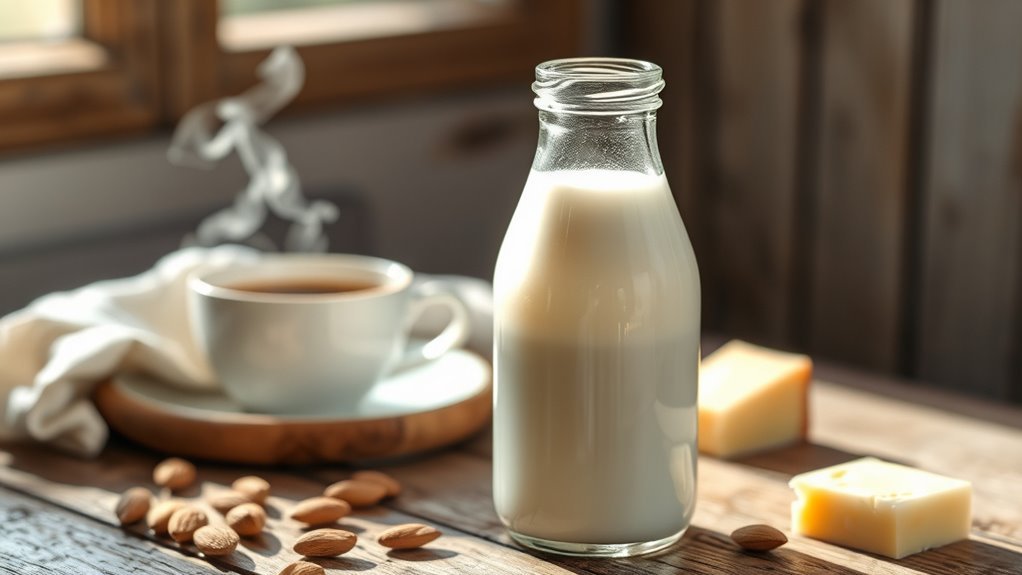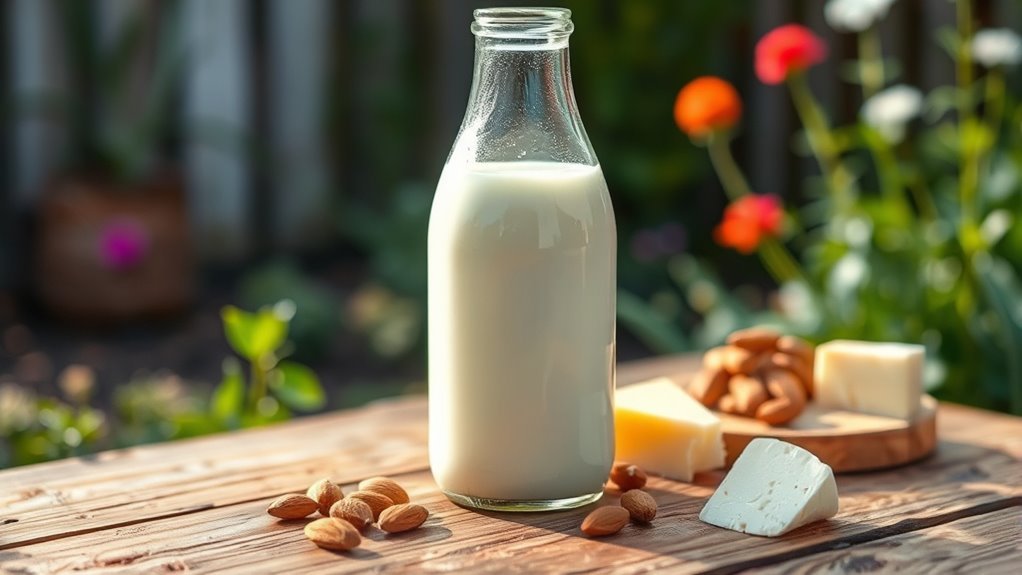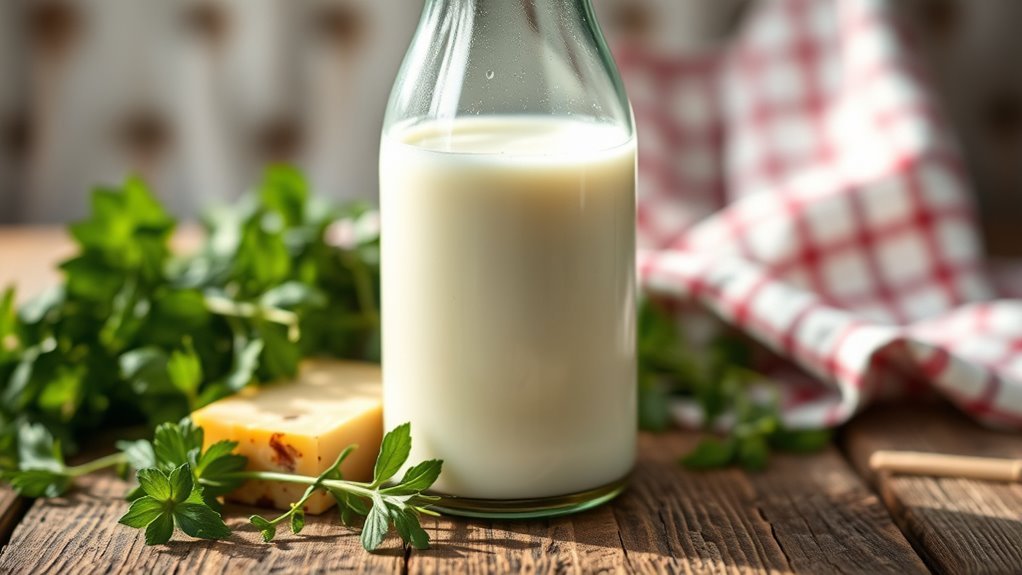Yes, raw milk can fit into a keto diet as it contains healthy fats and moderate carbohydrates. One cup has about 8 grams of fat and 12 grams of carbs, primarily from lactose. If you’re lactose intolerant, be cautious. While raw milk offers various health benefits, it’s crucial to take into account safety concerns and source it from reputable farms. If you want to explore more about its benefits and alternatives, there’s plenty more to learn.
Understanding Raw Milk and Its Nutritional Profile

While many people have strong opinions about raw milk, understanding its nutritional profile is vital if you’re considering incorporating it into your diet. Raw milk is packed with essential nutrients, including proteins, vitamins, and healthy fats, which can offer various nutritional benefits. Some proponents argue that it contains beneficial enzymes and probiotics that support gut health. However, it’s important to weigh these benefits against milk safety concerns. Raw milk can harbor harmful bacteria, posing risks especially for vulnerable populations. If you decide to venture into raw milk consumption, sourcing it from reputable farms and ensuring proper handling can mitigate some safety issues. Ultimately, balancing nutritional benefits with safety is key to making an informed decision.
Carb Content of Raw Milk

If you’re considering adding raw milk to your keto diet, it’s essential to understand its carbohydrate content. Raw milk typically contains about 12 grams of carbohydrates per 1 cup serving, primarily from lactose, a natural sugar. While this isn’t an overwhelming amount, it can add up, especially if you’re aiming to keep your daily carb intake below 20-50 grams. If you’re looking for lower-carb alternatives, options like unsweetened almond milk or coconut milk can be helpful as they often contain fewer carbs. Remember, while raw milk can be a nutritious option, it’s crucial to balance it with other carb sources in your diet to maintain ketosis. Always consider your personal dietary goals when making choices.
Health Benefits of Raw Milk

Raw milk offers several health benefits that can complement your diet, particularly due to its rich nutritional profile. Packed with vitamins, minerals, and beneficial enzymes, it provides nutritional advantages that processed milk often lacks. The presence of probiotics in raw milk can support gut health, enhancing digestion and immune function. Additionally, some studies suggest that raw milk may help reduce allergies and asthma symptoms in children. However, it’s essential to take into account raw milk safety; consuming unpasteurized products carries risks of bacterial contamination. If you choose to include raw milk in your diet, sourcing it from reputable farms and ensuring proper handling can greatly mitigate those risks. Enjoying raw milk can be a vibrant addition to a health-conscious lifestyle.
How Raw Milk Fits Into a Keto Diet
Incorporating raw milk into a keto diet can be beneficial, as it aligns well with the high-fat, low-carb principles of this eating plan. Its keto compatibility stems from its healthy fat content, which can help you meet your macronutrient goals. However, lactose considerations are essential; some individuals may be lactose intolerant, which can hinder their keto journey.
Here’s a quick overview:
| Nutrient | Raw Milk (per 1 cup) | Keto Recommendation |
|---|---|---|
| Calories | 150 | Moderate |
| Fat | 8 g | High |
| Carbohydrates | 12 g | Low |
In moderation, raw milk can be a delicious addition, providing essential nutrients while supporting your keto lifestyle!
Alternatives to Raw Milk on Keto
Are you looking for alternatives to raw milk that fit within your keto diet? You have several options that can satisfy your cravings while keeping carbs low. Nut milk alternatives, like almond or macadamia milk, are great choices, as they typically contain fewer carbs than dairy. Just be sure to choose unsweetened varieties to keep your carb intake in check. Additionally, coconut cream is an excellent option for adding richness to recipes or coffee. It’s high in healthy fats, making it perfect for a keto lifestyle. You can also explore hemp milk or flaxseed milk, both of which are low in carbs and can be used in various dishes. Embrace these alternatives for a delicious, keto-friendly experience!
Frequently Asked Questions
Is Raw Milk Safe to Drink Raw Without Pasteurization?
Drinking raw milk without pasteurization can be a controversial topic. While some argue it offers benefits like higher nutrient levels and probiotics, you should be cautious. Raw milk regulations vary by region, and unpasteurized milk can carry harmful bacteria. It’s important to evaluate the source and guarantee it’s from a reputable farm. Ultimately, the decision’s yours, but weighing the benefits against potential risks is vital for your health and safety.
Can Raw Milk Cause Lactose Intolerance Symptoms?
Raw milk can sometimes cause lactose intolerance symptoms, especially if your body struggles with lactose digestion. However, many find raw milk easier to digest due to its natural enzymes and probiotics, which may help in breaking down lactose. The benefits of raw milk, like its rich nutrient profile, can be appealing. If you’re lactose intolerant, it’s best to start with small amounts and monitor your body’s reaction to see how it responds.
How Much Raw Milk Can I Drink on Keto?
When considering how much raw milk you can drink on keto, it’s essential to follow keto guidelines. Generally, you should aim to keep your carb intake low, which means limiting raw milk due to its natural sugars. However, raw milk has benefits like probiotics and healthy fats that can be advantageous. If you choose to include it, limit your intake to a small serving and monitor how it fits into your overall carb count.
Does Raw Milk Contain Any Probiotics?
Yes, raw milk can contain probiotics, thanks to the natural fermentation process it undergoes. These probiotics offer various health benefits, like improved digestion and enhanced gut health. However, the probiotic content can vary based on factors like the milk’s source and handling. While raw milk’s fermentation can be beneficial, it’s crucial to take into account safety and quality. Always make sure you get your raw milk from reputable sources to maximize its probiotic benefits.
Are There Any Risks Associated With Raw Milk Consumption?
Ah, the thrill of sipping on raw milk! It’s like playing Russian roulette with your gut. Sure, it’s creamy and delicious, but let’s not ignore the health risks. Raw milk can harbor foodborne pathogens like E. coli and Salmonella, which aren’t exactly your friends. While some swear by its benefits, it’s crucial to weigh those against potential illnesses. If you’re up for the adventure, just make sure to choose your sources wisely!
Is raw milk keto-friendly?
Raw milk can be considered keto-friendly in moderation, as it contains healthy fats and proteins that align with a ketogenic diet. However, it also contains carbohydrates in the form of lactose, which may impact your daily carb limit. For those strictly adhering to a keto diet, it’s important to account for the carbohydrate content in raw milk, which is typically around 12 grams of carbs per cup.
What are the nutritional components of raw milk?
Raw milk is rich in nutrients, including healthy fats, proteins, vitamins (such as A, D, and B12), and minerals (like calcium and phosphorus). A typical cup of raw whole milk contains about 150 calories, 8 grams of protein, 8 grams of fat, and 12 grams of carbohydrates. It’s important to note that the nutritional profile can vary based on the source of the milk and the diet of the cows.
Can raw milk be included in a keto diet plan?
Yes, raw milk can be included in a keto diet plan, but it should be done with consideration of your overall carbohydrate intake for the day. If you choose to include raw milk, you might want to limit other sources of carbohydrates to maintain ketosis. Additionally, opting for full-fat raw milk can help ensure you’re getting more fats while keeping carbs in check.
Are there any health risks associated with drinking raw milk on keto?
While raw milk has nutritional benefits, it also carries health risks, such as the potential for contamination with harmful bacteria (like E. coli and Salmonella). These risks are particularly concerning for individuals with weakened immune systems. If you are considering including raw milk in your keto diet, it’s essential to source it from a reputable farm that practices safe handling and hygiene standards.
What alternatives to raw milk are better suited for a keto diet?
If you’re looking for alternatives to raw milk that are more keto-friendly, consider options like unsweetened almond milk, coconut milk, or heavy cream. These alternatives typically have lower carbohydrate counts and higher fat content, making them more suitable for a ketogenic diet. Always check the labels for added sugars and adjust your intake accordingly.
References
- https://www.ncbi.nlm.nih.gov/pmc/articles/PMC6347171/
- https://www.healthline.com/nutrition/raw-milk
- https://www.cdc.gov/foodsafety/rawmilk/raw-milk-questions-and-answers.html
- https://www.wisewell.com/blogs/blog/the-ketogenic-diet-and-dairy
- https://www.mayoclinic.org/healthy-lifestyle/nutrition-and-healthy-eating/expert-answers/raw-milk/faq-20058017
- https://www.ift.org/news-and-publications/food-technology-magazine/issues/2021/december/columns/science-of-food/raw-milk-and-food-safety
- https://www.foodsafety.gov/blog/raw-milk-in-the-us.html
- https://www.who.int/news-room/questions-and-answers/item/raw-milk-and-health-risks


